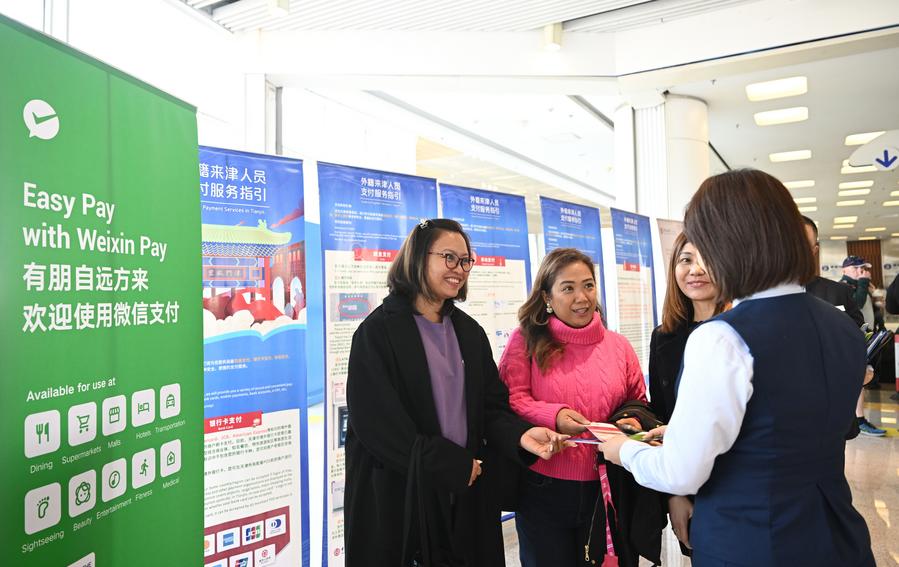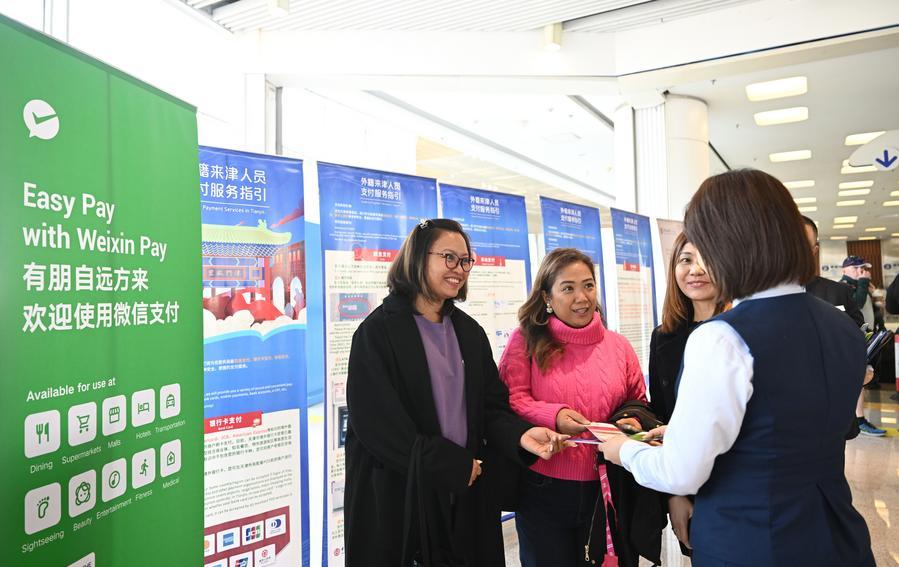
A staff member provides foreign tourists with guide materials about payment methods in north China's Tianjin Municipality on April 7, 2024. (Xinhua/Sun Fanyue)
BEIJING, July 4 (Xinhua) -- International bank card clearing institutions, such as Visa and Mastercard, have reduced transaction fees on overseas bank cards for Chinese merchants, a move expected to encourage more local merchants to accept these card payments.
This aligns with China's efforts to build a fully accessible, diversified and globally compatible payment ecosystem.
As the finance and banking sector embraces technological advancements, the high fees that merchants are charged for overseas bank cards remain a significant obstacle. The recent fee cut is expected to optimize the environment for overseas bank card payments in China.
Each time a consumer swipes a bank card at a store, the store must pay a transaction fee. In China, shops pay around 0.6 percent of the transaction amount for domestic bank cards, while the fee for overseas bank cards was previously 2.5 to 3 percent, before the recent adjustment to 1.5 percent.
"The recent cut in overseas bank card transaction fees for merchants can relieve our burden," said Tan Lei, deputy general manager of Chengdu Hongqi Chain Co., Ltd., a company involved in the supermarket and department store sector.
Even before the fee reduction by global bank card organizations was implemented, Tan received government subsidies under a supportive policy launched in February in southwest China's Sichuan Province. This policy has encouraged merchants to purchase or upgrade point-of-sale machines capable of reading overseas bank cards.
Tan said that nearly 3,700 of his company's stores will be able to accept overseas bank card payments by the end of July, following the subsidized upgrades.
In the ever-evolving world of finance and technology, bank card payments remain globally popular. China is working to bridge the differences in payment practices domestically and internationally to provide better overseas bank card services.
In early March, China released a guideline aimed at continuing to optimize payment services of bank cards, promoting cash use and facilitating mobile payment as part of the efforts to better fulfill the diverse payment preferences of foreigners and senior citizens in the country.
Following the rollout of this policy, Chinese authorities took decisive steps to facilitate bank card payments.
A circular jointly issued by the National Development and Reform Commission and four other government bodies in late June stressed that China will promote the acceptance of overseas bank cards in various venues and stores, enabling easier access to dining, accommodation, transportation, ticket purchases and reservations for international visitors to the country.
The fees associated with overseas bank card payments are often shared by international card organizations, receiving parties, card issuers and other participants. Therefore, reducing the costs of such payments requires coordinated efforts from all involved parties.
By the end of June, the relevant Chinese institutions had largely completed fee adjustments, reducing offline card transaction fees for merchants across the board except for some specific industries.
According to the Agricultural Bank of China, one of the country's largest commercial lenders, the adjusted transaction fees have benefited over 45,000 merchants.
The bank said that the value of overseas card transactions by their clients has increased by 157 percent year on year, while the number of such transactions has soared by 188 percent.




 A single purchase
A single purchase









